SportBoard Conference
“How can we restore ethics and fair play to grassroots sport?”
On Thursday, November 14th, Sport and Citizenship hosted the final conference of the SportBoard project, a European initiative aimed to improve good governance of grassroots sport organisations and governing bodies. The event brought together policymakers, experts, and practitioners to present the outcomes of the project, discuss strategies to combat discrimination, and promote good practices in preventing unethical behaviour in sports.
The SportBoard project developed a groundbreaking application designed to monitor sports behaviour, addressing both positive and negative incidents. Tested by 800 athletes, the app categorizes risky behaviours such as harassment, bullying, discrimination, doping, abuse, violence, and match-fixing into four broad families: respect, fair play, healthy sport, and quality in practice. These categories provide a structured framework for understanding and addressing unethical behaviour. By enabling easy documentation of incidents and providing coaches with guidance from sports psychologists, the app supports clubs and organizations in fostering a culture of accountability and respect.
Insights from policymakers
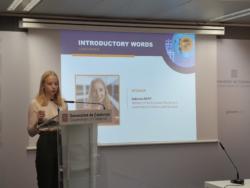 The conference began with a key speech by MEP Sabrina Repp, a member of the European Parliament’s Committee on Culture and Education. Repp underscored the power of sports to unite people, break down stereotypes, and promote inclusion across diverse communities. She voiced her support for initiatives like SportBoard, which champion inclusivity and ethical practices in sports. Repp also called for increased investment in grassroots sports through initiatives such as Erasmus+, alongside a comprehensive European strategy to promote ethics and inclusion in the sporting world. Highlighting the role of sports in instilling positive values in young people, she urged policymakers to leverage this potential to benefit society.
The conference began with a key speech by MEP Sabrina Repp, a member of the European Parliament’s Committee on Culture and Education. Repp underscored the power of sports to unite people, break down stereotypes, and promote inclusion across diverse communities. She voiced her support for initiatives like SportBoard, which champion inclusivity and ethical practices in sports. Repp also called for increased investment in grassroots sports through initiatives such as Erasmus+, alongside a comprehensive European strategy to promote ethics and inclusion in the sporting world. Highlighting the role of sports in instilling positive values in young people, she urged policymakers to leverage this potential to benefit society.
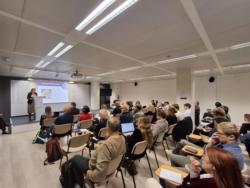 Florencia Van Houdt, Head of the Sport Unit at the European Commission, followed with a discourse on the transformative role of sports in promoting respect, equality, and solidarity. She outlined the Commission’s vision for a future European sports model rooted in ethical principles and fair play, emphasizing the importance of ensuring that sports continue to act as a unifying force in an increasingly polarized world.
Florencia Van Houdt, Head of the Sport Unit at the European Commission, followed with a discourse on the transformative role of sports in promoting respect, equality, and solidarity. She outlined the Commission’s vision for a future European sports model rooted in ethical principles and fair play, emphasizing the importance of ensuring that sports continue to act as a unifying force in an increasingly polarized world.
SportBoard project findings
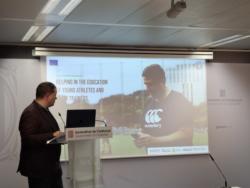 Project manager Albert Salarich presented an overview of the app’s functionalities and its impact. He explained how the app’s ability to document incidents in real-time empowers stakeholders to address unethical behaviours effectively. Dr. Cristina Cabrejas Mata, a sports science professor at Ramon Llull University, delved into the data collected during the project, revealing that most incidents were reported during competitions, reflecting the heightened emotions and interactions in such settings. Interestingly, while 56.5% of the reports highlighted positive behaviours, serious risks were more frequently associated with girls than boys, despite girls receiving higher positive evaluations overall. These findings led to key recommendations, including the development of universal indicators for ethical behaviour, continuous training for coaches and parents, and the implementation of unified ethical codes across sports organizations.
Project manager Albert Salarich presented an overview of the app’s functionalities and its impact. He explained how the app’s ability to document incidents in real-time empowers stakeholders to address unethical behaviours effectively. Dr. Cristina Cabrejas Mata, a sports science professor at Ramon Llull University, delved into the data collected during the project, revealing that most incidents were reported during competitions, reflecting the heightened emotions and interactions in such settings. Interestingly, while 56.5% of the reports highlighted positive behaviours, serious risks were more frequently associated with girls than boys, despite girls receiving higher positive evaluations overall. These findings led to key recommendations, including the development of universal indicators for ethical behaviour, continuous training for coaches and parents, and the implementation of unified ethical codes across sports organizations.
Expert and athlete perspectives
The event also featured insights from various experts in the field, presented during the roundtable discussion “How can we restore ethics and fair play to grassroots sport?”. Norbert Rubicsek, director of the CSCF Foundation for Sport Integrity, shared his experiences in tackling sports manipulation, emphasizing the need for collaboration between sports organizations and law enforcement to protect sports from organized crime. He highlighted educational initiatives in partnership with UEFA and national federations to implement ethical values in young athletes.

Gwenda Stevens, President of the International Federation for Sports Officials, discussed her extensive efforts to promote gender equality and improve the working conditions of referees. Drawing from her personal experience as an international umpire, she underscored the importance of integrating referees into ethical discussions and ensuring they receive proper recognition for their role in maintaining the integrity of sports. She also advocated for the creation of a dedicated commission for referees within every Olympic committee, noting the positive example set by the Belgian Olympic Committee, which already has such a commission in place.
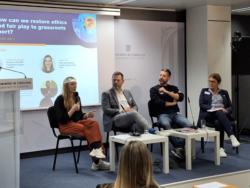 Marco Neviani, director of Anderlini Net, spoke about the role of coaches and parents in shaping ethical behaviours. He shared experiences from European projects where parental involvement in ethics discussions was key to fostering a supportive environment. He also emphasized the need to adapt messaging about ethics to suit different age groups, using creative methods like games and visuals to engage young athletes effectively.
Marco Neviani, director of Anderlini Net, spoke about the role of coaches and parents in shaping ethical behaviours. He shared experiences from European projects where parental involvement in ethics discussions was key to fostering a supportive environment. He also emphasized the need to adapt messaging about ethics to suit different age groups, using creative methods like games and visuals to engage young athletes effectively.
Gaelle Mys, a former Olympian gymnast, provided a deeply personal perspective, contrasting her negative experiences in competitive gymnastics with the positive and encouraging environment she found in the performance arts at Cirque du Soleil. She advocated for constructive coaching methods that prioritize mental health and well-being, reflecting the growing awareness of these issues in the sports world.
Workshops on combating discrimination and improving governance
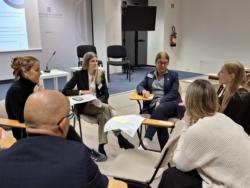 The conference also included two interactive workshops addressing the theme “How to Act Against Discriminatory Behaviours in Sport?”. The first workshop, led by Marlyse Royer of Stop Racism in Sport, outlined the association’s approach to tackling racism in the sporting world. A range of initiatives, including activities, awareness campaigns, and training sessions, are made available to clubs, coaches, managers, supporters, parents, and fans to promote inclusivity and equality. The workshop highlighted key barriers to combating discrimination in sport, including a lack of information, awareness, and support among coaches and managers. Solutions discussed included active resource dissemination, appointing independent third parties to support athletes, and implementing preseason training sessions to promote inclusivity. Organizations like Stop Racism in Sport play a crucial role in driving these efforts and shaping a more equitable sporting environment.
The conference also included two interactive workshops addressing the theme “How to Act Against Discriminatory Behaviours in Sport?”. The first workshop, led by Marlyse Royer of Stop Racism in Sport, outlined the association’s approach to tackling racism in the sporting world. A range of initiatives, including activities, awareness campaigns, and training sessions, are made available to clubs, coaches, managers, supporters, parents, and fans to promote inclusivity and equality. The workshop highlighted key barriers to combating discrimination in sport, including a lack of information, awareness, and support among coaches and managers. Solutions discussed included active resource dissemination, appointing independent third parties to support athletes, and implementing preseason training sessions to promote inclusivity. Organizations like Stop Racism in Sport play a crucial role in driving these efforts and shaping a more equitable sporting environment.
The second workshop, facilitated by Dr. Verònica Riera, focused on strategies for good sport governance to promote ethical behaviour. Participants discussed various barriers that hinder progress in implementing good governance and ethical practice, such as limited financial and human resources, resistance to change within organizations, and a lack of awareness about what integrity truly means.
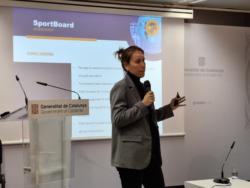 Dr. Riera highlighted initiatives promoting ethics in sports, such as “Todos Olímpicos” by the Comité Olímpico Español and “Más que Tenis” by the Fundación Rafa Nadal and Special Olympics, as examples of positive actions. Several solutions were proposed to overcome these challenges, including organizing events like “Captain Days” to foster leadership, launching national awareness campaigns to deepen understanding of ethics, and increasing collaboration between schools, clubs, and communities. Additionally, providing more funding to clubs that demonstrate excellence in ethics and replicating their successful practices were considered essential measures. Dr. Riera concluded by emphasizing the need for continuous evaluation and improvement of governance practices to ensure sustained and meaningful progress in promoting ethics in sports over time.
Dr. Riera highlighted initiatives promoting ethics in sports, such as “Todos Olímpicos” by the Comité Olímpico Español and “Más que Tenis” by the Fundación Rafa Nadal and Special Olympics, as examples of positive actions. Several solutions were proposed to overcome these challenges, including organizing events like “Captain Days” to foster leadership, launching national awareness campaigns to deepen understanding of ethics, and increasing collaboration between schools, clubs, and communities. Additionally, providing more funding to clubs that demonstrate excellence in ethics and replicating their successful practices were considered essential measures. Dr. Riera concluded by emphasizing the need for continuous evaluation and improvement of governance practices to ensure sustained and meaningful progress in promoting ethics in sports over time.
Conclusion
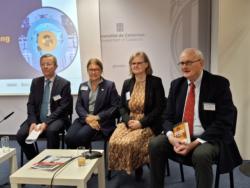 The event concluded with a compelling intervention by Philippe Housiaux, President of the European Fair Play Movement and President of Panathlon Wallonie-Bruxelles, who has been a staunch advocate for ethics and fair play for over 20 years. He highlighted fair play as a timeless value with the power to drive societal progress. Despite the challenges of limited time and resources in schools and clubs, Housiaux emphasized the importance of instilling these values in sports. Housiaux showcased key initiatives, including the Fair Play Calendar with 364 daily reasons to promote fair play, World Fair Play Day and projects like “1000 Kilometers for Fair Play” and a traveling exhibition reaching over a million people. On a European scale, he presented Crossing Europe for Fair Play and Peace and underscored the role of Olympians as ambassadors to inspire younger generations through respect, teamwork, and good citizenship. “Together,” he concluded, “let’s create the fair play world we all aspire”.
The event concluded with a compelling intervention by Philippe Housiaux, President of the European Fair Play Movement and President of Panathlon Wallonie-Bruxelles, who has been a staunch advocate for ethics and fair play for over 20 years. He highlighted fair play as a timeless value with the power to drive societal progress. Despite the challenges of limited time and resources in schools and clubs, Housiaux emphasized the importance of instilling these values in sports. Housiaux showcased key initiatives, including the Fair Play Calendar with 364 daily reasons to promote fair play, World Fair Play Day and projects like “1000 Kilometers for Fair Play” and a traveling exhibition reaching over a million people. On a European scale, he presented Crossing Europe for Fair Play and Peace and underscored the role of Olympians as ambassadors to inspire younger generations through respect, teamwork, and good citizenship. “Together,” he concluded, “let’s create the fair play world we all aspire”.
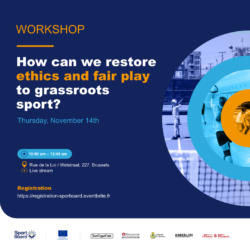 To conclude, the SportBoard final conference not only highlighted the groundbreaking achievements of the project, like the app for monitoring sports behaviour, but also sparked critical discussions on combating discrimination and promoting good governance in grassroots sports. Emphasizing education, collaboration, and stakeholder involvement, the event showcased tools like Erasmus+ and initiatives such as World Fair Play Day to address discrimination and promote fair play. By fostering fair play, teamwork and respect, sports can inspire not only better athletes but also responsible citizens, paving the way for a more inclusive and united society.
To conclude, the SportBoard final conference not only highlighted the groundbreaking achievements of the project, like the app for monitoring sports behaviour, but also sparked critical discussions on combating discrimination and promoting good governance in grassroots sports. Emphasizing education, collaboration, and stakeholder involvement, the event showcased tools like Erasmus+ and initiatives such as World Fair Play Day to address discrimination and promote fair play. By fostering fair play, teamwork and respect, sports can inspire not only better athletes but also responsible citizens, paving the way for a more inclusive and united society.
– If you missed the event, you can watch it: https://youtu.be/nYnKevXX-cs
This article was written as part of SportBoard project.
– Discover the app of the project: https://play.google.com/store/apps/details?id=eu.project.ethics4sports&hl=fr
– Find out more at: https://play.google.com/store/apps/details?id=eu.project.ethics4sports&hl=fr











 MEMBERSHIP
MEMBERSHIP CONTACT
CONTACT FACEBOOK
FACEBOOK